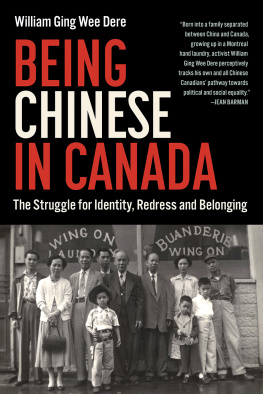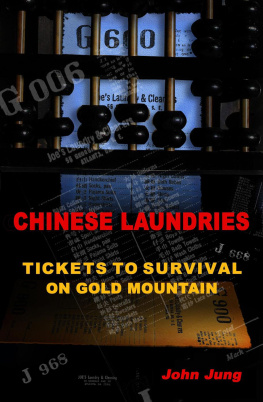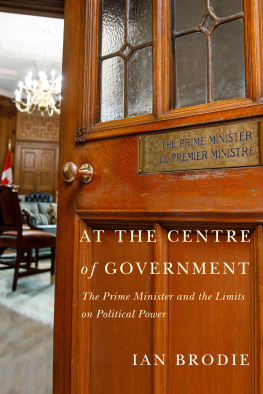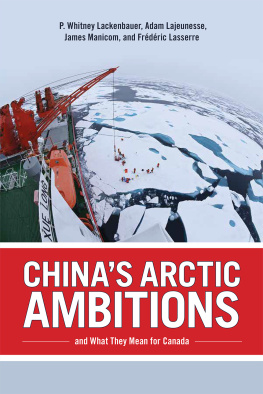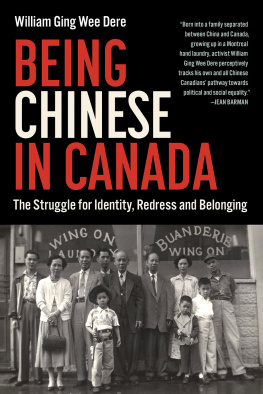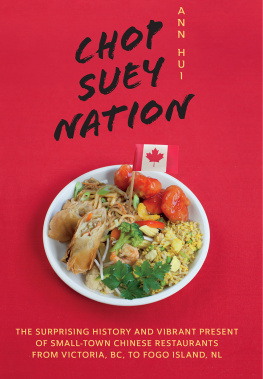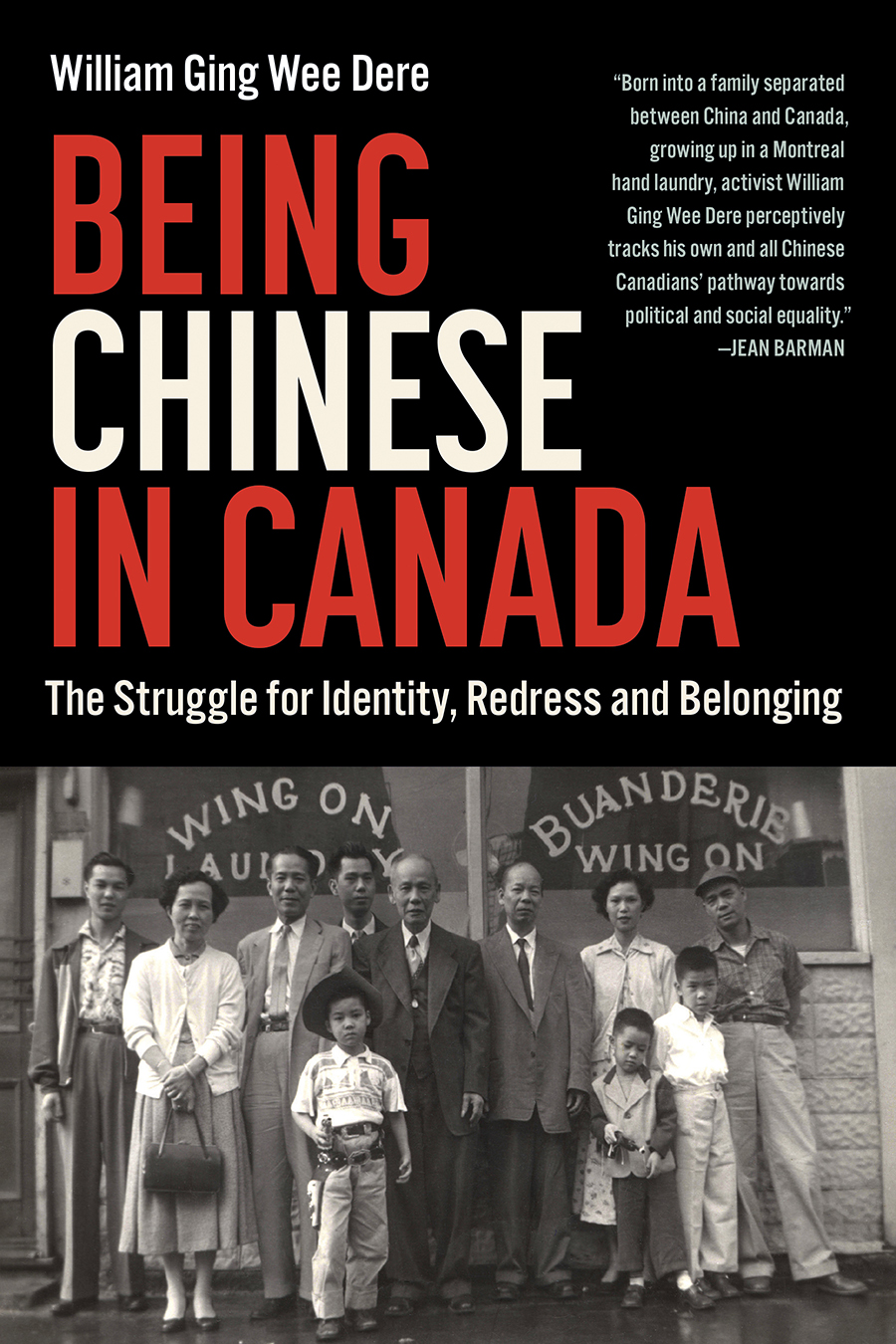BEING CHINESE IN CANADA
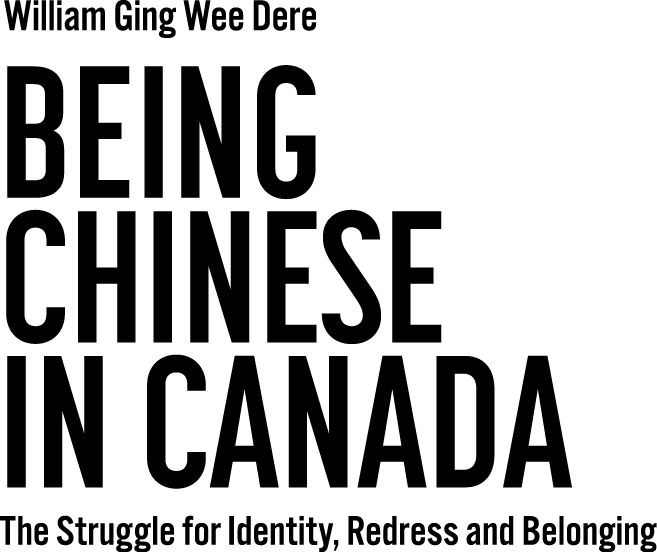

Copyright 2019 William Ging Wee Dere
All rights reserved. No part of this publication may be reproduced, stored in a retrieval system or transmitted, in any form or by any means, without prior permission of the publisher or, in the case of photocopying or other reprographic copying, a licence from Access Copyright, .
Douglas and McIntyre (2013) Ltd.
P.O. Box 219, Madeira Park, BC , V0N 2H0
www.douglas-mcintyre.com
Excerpts from THE WRETCHED OF THE EARTH by Frantz Fanon, English translation copyright 1963 by Prsence Africaine. Used by permission of Grove/Atlantic, Inc. Any third party use of this material, outside of this publication, is prohibited.
Excerpts from RED STAR OVER CHINA by Edgar Snow, copyright 1938, 1944 by Random House, Inc, 1961 by John K. Fairbank, 1968 by Edgar Snow. Used by permission of Grove/Atlantic, Inc. Any third party use of this material, outside of this publication, is prohibited.
Edited by Cheryl Cohen
Indexed by Ellen Hawman
Cover design by Diane Robertson
Text design by Carleton Wilson
Printed and bound in Canada



Douglas and McIntyre (2013) Ltd. acknowledges the support of the Canada Council for the Arts, which last year invested $153 million to bring the arts to Canadians throughout the country.
Nous remercions le Conseil des arts du Canada de son soutien. Lan dernier, le Conseil a investi 153 millions de dollars pour mettre de lart dans la vie des Canadiennes et des Canadiens de tout le pays.
We also gratefully acknowledge financial support from the Government of Canada and from the Province of British Columbia through the BC Arts Council and the Book Publishing Tax Credit.
Library and Archives Canada Cataloguing in Publication
Dere, William Ging Wee, author
Being Chinese in Canada : the struggle for identity, redress and belonging / William Ging Wee Dere.
Includes bibliographical references and index.
Issued in print and electronic formats.
ISBN 978-1-77162-218-9 (softcover).-- ISBN 978-1-77162-219-6 ( HTML )
1. Chinese Canadians--History. 2. Chinese--Canada--History. 3. Chinese Canadians--Social conditions. 4. Chinese--Canada--Social conditions. 5. Chinese Canadians--Social life and customs. 6. Chinese--Canada--Social life and customs. 7. Chinese--Race identity--Canada. 8. Canada--Race relations. 9. Dere, William Ging Wee I . Title.
FC106.C5D47 2019971'.004951C2018-905046-2
C2018-905047-0
This book is dedicated to:
Dong Qing, my wife and companion on this journey
&
My children, Jessica Mao-An and Jordan Ying Hua
Contents
Introduction
This book is a voice from Chinese Canada. It is a voice from the margins and firmly plants itself in the soil of Canada and Quebec. It explores my selective memories as a Chinese Canadian activist; my motivations and my conscious and subconscious desires to seek my true identity, culture and place of belonging. I dont consider myself a witness to history. I was too involved to be able to step back and give an objective testimony of pivotal events involving Chinese Canadians from the 1960s to today. This is a personal account of how events affected me and perhaps how I might have had an influence, however small, on them.
As the chapters that follow will make clear, the infamous and hefty head tax that Canada chose to levy only on Chinese immigrants has been a particular focus of many of my years in this country, including my participation in the head tax redress movement. The long-lasting effects on families caused by the Chinese Head Tax and Exclusion Act ( HTEA ) are incalculable. For sixty-two years, an entire community was prevented, by law, from integrating into Canadian society. The Chinese community did not develop in a normal fashion since the law prevented families from reuniting or starting in Canada. A total of 81,000 Chinese immigrants paid a total of $23 million into the coffers of the Canadian federal and provincial governments. Those governments indeed showed that they could profit from racism.
I was born in China. I spent the first five years of my life there with my mother and siblings, and the next two in Hong Kong. My father and grandfather sent money from Canada, where they had both immigrated before Canada brought in the legislation that made it impossible for them to bring their wives to join them. My fathers last trip back to China was in 1947. I discovered that detail only after his death, through his head tax certificate. He had held on to it, along with other papers he kept safe for fear of being deported if any of them were lost.
On a personal level, Being Chinese in Canada explores why my father and grandfather decided to immigrate to Canada and how they survived in an unwelcoming society. But the personal is only a small part of a broader picture that became clear to me, during my research for this book, as I looked through the General Register of Chinese Immigrationa thousand volumes that Canada used to record and control Chinese immigrants. Its a little known Canadian artifact that lists information about each Chinese person who was made to pay the head tax to come into the country.
I originally set out to write about my involvement in the redress movement for the HTEA . The Chinese Immigration Act of 1885 levied the head taxwhich started at $50, rose to $100, and eventually settled at $500 per personon those Chinese immigrants allowed into the country. The tax was replaced in 1923 by another Chinese Immigration Act, this one banning all Chinese immigration until 1947. It would be another twenty years before Chinese people were treated like others wanting to immigrate to Canada. Obtaining government redress was a further long battle. It was a defining period in the history of Chinese Canadian reality in this country and I was engaged for twenty years of my life in this struggle.
As I tossed the idea of my book to my daughter, Jessica, she lobbed back another suggestion: I love it when you and mommy tell me about what you did in the Party. Why dont you write about that? As she was growing up, I dragged her to countless head tax meetings. She helped me organize workshops, study groups and concerts. She even appeared in Moving the Mountain, the 1993 documentary about the HTEA that I co-directed with Malcolm Guy. To her, the redress campaign was old hat. But she thought it was so romantic that her mother, Gillian Taylor, and I had met and fallen in love as comrades. I thought about all this and the redress book I was planning to write gradually grew.
Knowing my cultureChinese Canadian cultureis the key to understanding and defining my identity in Canada and Quebec. It is a lifelong quest. I am talking about a stereotype-breaking, in-your-face kind of culture, the kind of social understanding and feeling that reflect the everyday struggles and experiences of living in Chinese Canada. The kind of social understanding and feeling that establish our place and identity in this country.

